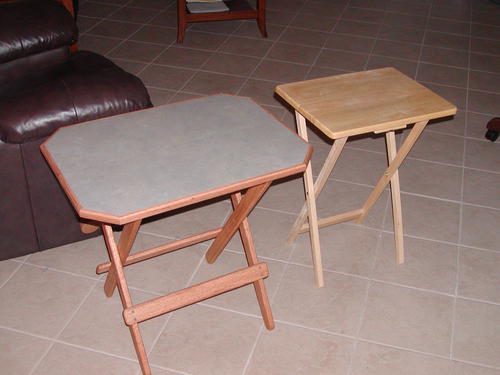 I have always disliked the small unstable, fold-up, finger-eating TV
tables. A friend showed me one his father had built back in the 60's and
I was able to copy it for the most part and I made a couple of
improvements.
I have always disliked the small unstable, fold-up, finger-eating TV
tables. A friend showed me one his father had built back in the 60's and
I was able to copy it for the most part and I made a couple of
improvements.
 I have always disliked the small unstable, fold-up, finger-eating TV
tables. A friend showed me one his father had built back in the 60's and
I was able to copy it for the most part and I made a couple of
improvements.
I have always disliked the small unstable, fold-up, finger-eating TV
tables. A friend showed me one his father had built back in the 60's and
I was able to copy it for the most part and I made a couple of
improvements.
Made of oak with a Formica top and linseed oil finish. This is quite strong, stable, large enough to play cards on and it will not get knocked over accidentally.
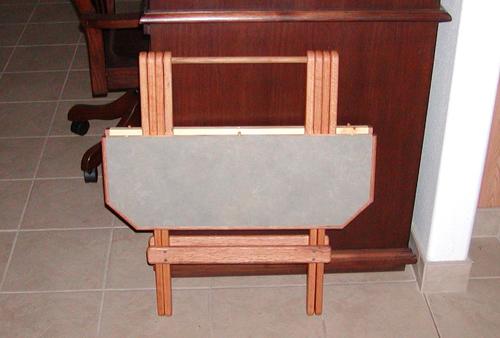 It incorporates a clever, yet simple folding mechanism and has its own carry handle.
It incorporates a clever, yet simple folding mechanism and has its own carry handle.
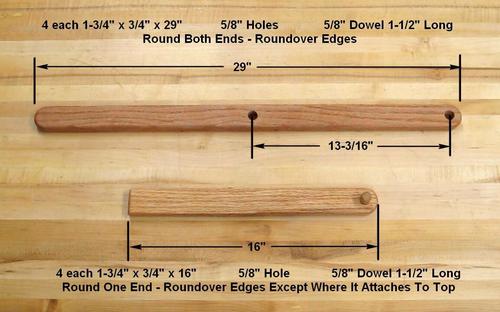 The legs and support arms are of the same cross section 1-3/4" x 3/4".
The four legs are 29" long and the four support arms are 16" long. The
four legs and the four support arms are drilled the
same, all with 5/8" holes. The support arms are drilled for
attachment to the table top as shown. Four 5/8" dowels 1-1/2" long and
one 5/8" dowel 16" long are required. Round both ends of the legs and
the drilled end of the support arms. Round over the edges except where
the support arms mate with the tabletop halves.
The legs and support arms are of the same cross section 1-3/4" x 3/4".
The four legs are 29" long and the four support arms are 16" long. The
four legs and the four support arms are drilled the
same, all with 5/8" holes. The support arms are drilled for
attachment to the table top as shown. Four 5/8" dowels 1-1/2" long and
one 5/8" dowel 16" long are required. Round both ends of the legs and
the drilled end of the support arms. Round over the edges except where
the support arms mate with the tabletop halves.
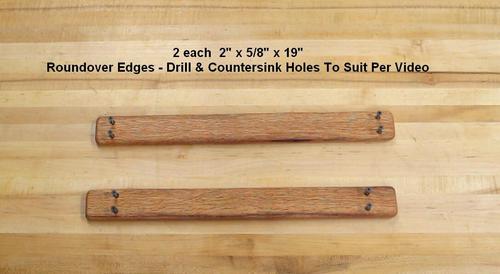 The two spreaders are 2" x 5/8" x 19". Holes are drilled in these for
attachment to the legs. Each is drilled as shown in the photo. Round the
corners and round over the edges.
The two spreaders are 2" x 5/8" x 19". Holes are drilled in these for
attachment to the legs. Each is drilled as shown in the photo. Round the
corners and round over the edges.
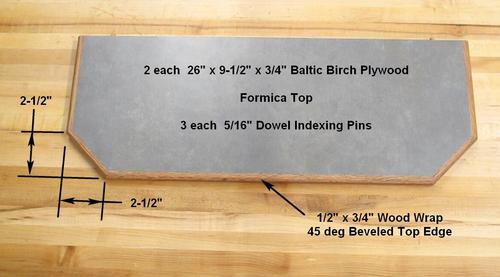 I used 3/4" pine for the top and covered it with Formica. Baltic
Birch would be better. I edge drilled the contacting edges
for three 5/16" indexing dowels, which keep the two table top halves
from sliding back & forth. That makes the table much sturdier and it doesn't
wiggle around like the original. Cut the corners off as shown and add oak
to the outside edges.
I used 3/4" pine for the top and covered it with Formica. Baltic
Birch would be better. I edge drilled the contacting edges
for three 5/16" indexing dowels, which keep the two table top halves
from sliding back & forth. That makes the table much sturdier and it doesn't
wiggle around like the original. Cut the corners off as shown and add oak
to the outside edges.
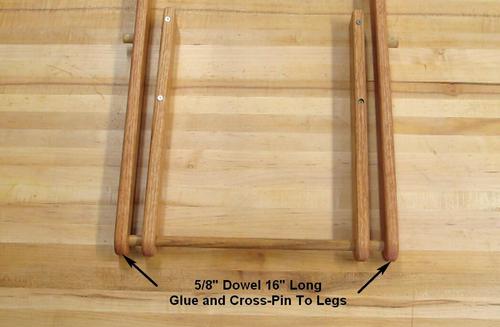 Glue the short dowels in place per the attached photos. Each pair of
legs and support arms is assembled differently. The 16" long dowel
spreader (handle) is only glued to the inside legs. The support arms are
free to pivot on the 16" long dowel spreader.
Glue the short dowels in place per the attached photos. Each pair of
legs and support arms is assembled differently. The 16" long dowel
spreader (handle) is only glued to the inside legs. The support arms are
free to pivot on the 16" long dowel spreader.
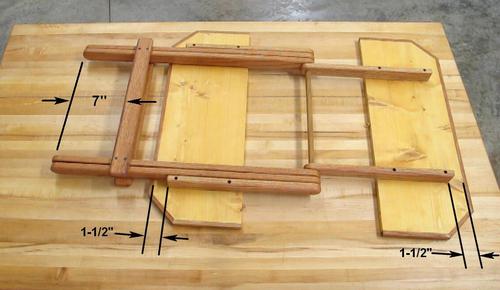 Attach the two spreaders to the legs and the support arms to the
tabletop as shown. I predrilled the holes and used drywall screws. Grind
the points off the screws for the tabletop. It gives better grip for the
screws and they won't poke through the Formica as easily.
Attach the two spreaders to the legs and the support arms to the
tabletop as shown. I predrilled the holes and used drywall screws. Grind
the points off the screws for the tabletop. It gives better grip for the
screws and they won't poke through the Formica as easily.
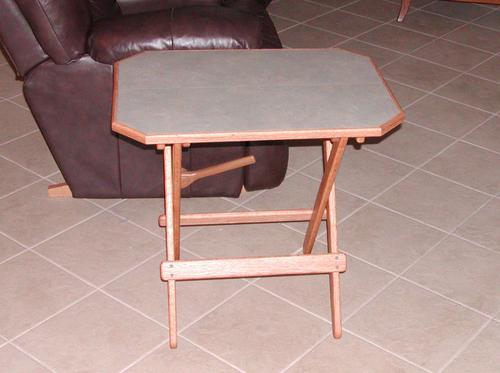 I varnished the oak edges of the tabletop and used linseed oil
everywhere else.
I varnished the oak edges of the tabletop and used linseed oil
everywhere else.
If you want to build this table, please also watch the video.
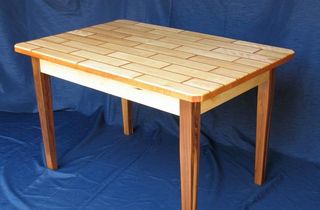 Building tables
Building tables